Previously we looked at the BBC News website’s initial coverage of the July 27th Hizballah attack on Majdal Shams which caused the deaths of twelve children and injuries to dozens more people.
BBC NEWS WEBSITE COVERAGE OF THE MAJDAL SHAMS MASSACRE
The following day saw the appearance of filmed and written reports from Majdal Shams by the BBC’s Paul Adams which, as in the initial reporting, continued the editorial stance of promoting Hizballah’s denials of involvement along with politicised portrayals of the location of the attack. [emphasis added]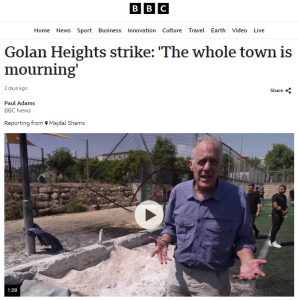
“‘There was a siren, but no-one had time to react’”
“The BBC’s Paul Adams has visited the site where 12 people, mostly children, were killed in the Israeli-occupied Golan Heights on Saturday.
Israel has blamed Hezbollah for the strike, which hit a football pitch in Majdal Shams, but the Lebanese militant group strongly denies any involvement.”
“Golan Heights strike: ‘The whole town is mourning’”
“Israel says the rocket was fired from Shebaa, a small village just a short distance away across the western flank of Mt Hermon, which towers over Majdal Shams.
Hezbollah disputes Israel’s claim, but around the time the rocket landed here, its media outlets announced that it had fired rockets towards an Israeli military base less than two miles from the football pitch.”
In addition, Adams produced an audio item titled “What is the Golan Heights and who are the Druze?” in which he “looks at the area’s complex history” – in less than three minutes.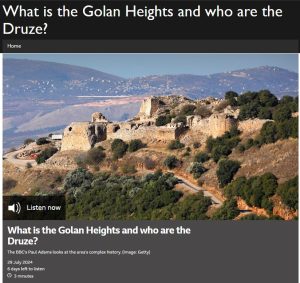
Unsurprisingly to anyone familiar with the BBC’s record, that “complex history” begins in June 1967.
Adams: “In 1967 when Israel fought and won the Six Day War against its Arab neighbours, it captured several key bits of territory. The Sinai Peninsula, the Gaza Strip from Egypt, the West Bank and East Jerusalem from Jordan and the Golan Heights from Syria.”
Adams fails to tell BBC audiences that in 1948 the Gaza Strip had been invaded by Egypt and that Jordan had invaded and occupied what it later renamed “the West Bank” and parts of Jerusalem – all of which were part of the territory designated for the creation of a Jewish homeland under the Mandate for Palestine. He also refrains from providing listeners with any context to the Six Day War, including the fact that in the years before, the Syrian army had repeatedly launched attacks against Israeli communities from its many military bases on the Golan Heights.
Referring to the Druze community living in the four small towns in the Golan Heights, Adams tells listeners that:
Adams: “Until 1967 they were citizens of Syria. Now suddenly they found themselves living under Israeli rule. The Golan Heights […] was now Israeli-occupied territory.”
Druze communities in the Golan were initially established in the 17th and 18th centuries. In 1923, Britain and France reached agreements concerning the boundaries of their respective mandates, placing most of the Golan – formerly Ottoman Empire territory – under the control of the French administered mandate for Syria, which lasted until 1946. In other words, by 1967 the Druze had been citizens of an independent Syria for 21 years.
Additional coverage published on the BBC News website on July 28th included a live page.
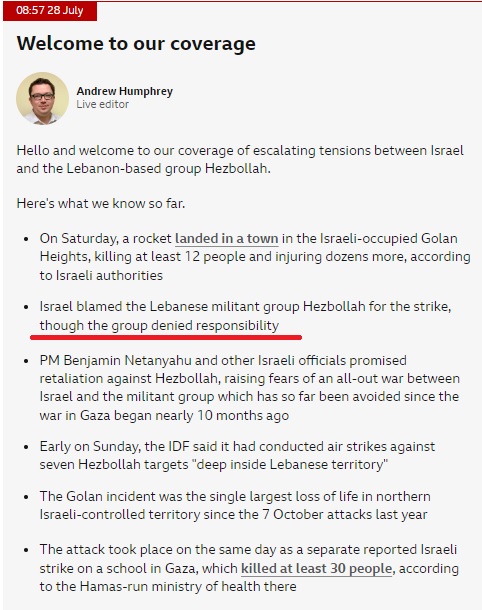
The BBC News website published a report on July 28th about the funerals of ten of the victims under the headline “Thousands mourn children killed in Golan Heights strike”. Written by Mallory Moench, that report tells BBC audiences that: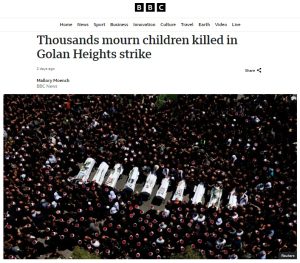
“The White House, meanwhile, said Iran-backed militant group Hezbollah carried out the attack, which killed 12. Israel has also accused it. Hezbollah denies it was responsible.”
And:
“Hezbollah denied it had anything to do with the strike, but had earlier on Saturday claimed responsibility for four other attacks, including one on a military base around 3km (2 miles) away.”
As was the case in the BBC’s initial reporting, readers were not told that Hizballah’s original claim of responsibility for an attack on that military base (which did not happen) stated that it had been carried out using “one Falaq missile” – the same type of missile that hit the football field in Majdal Shams. Neither did Moench clarify that Hizballah’s denials of responsibility for the attack on Majdal Shams began only after reports of civilian casualties emerged.
The report states:
“At a funeral in Majdal Shams on Sunday, weeping men wearing traditional red-topped white hats carried 10 of the white-covered caskets through packed streets, AFP reported. Women dressed in black abaya robes cried as they laid flowers on the caskets. Some mourners carried large photos of the dead children.”
Clearly Moench did not fact check that AFP report because had she done so, she would know that Druze women do not wear “abaya robes”.
Without providing any evidence for her claim, Moench tells her readers that:
“But most of those [Druze] in the Golan have retained an allegiance to Syria. They can still study and work in Israel, though only those with citizenship can vote and serve in the army.”
As in the BBC’s previous reports, readers are not told that around 20% of the Druze residents of the Golan Heights are Israeli citizens, with the rest holding the status of permanent residents.
Following the template set in the BBC’s initial reporting of the story, Moench tells readers that:
“The vast majority of the international community does not recognise Israel’s annexation of the Golan Heights from Syria in 1981.”
And once again readers find the BBC promoting baseless claims suggesting Israeli responsibility for the attack.
“Lebanon’s Foreign Minister Abdallah Bouhabib told the BBC that he did not think Hezbollah carried out the attack, but added “it could be a mistake by the Israelis or by Hezbollah – I don’t know”.”
Visitors to the BBC News website had to wait until the afternoon of July 28th to find an informed and clear account of Hizballah’s attack in a report by Hugo Bachega titled “Lebanon fears new phase in Hezbollah-Israel fighting”.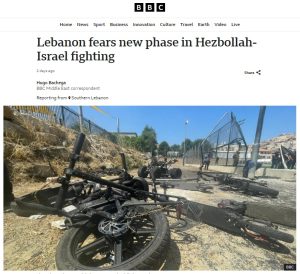
“Israel accuses Hezbollah of carrying out the strike on a football pitch that killed at least 12 people, including children, the deadliest attack in the current hostilities, and has promised to respond. […]
Hezbollah denies being behind the attack.
Before the scale of the strike became clear, however, the group said it had targeted the Hermon Brigade with an Iranian-made Falaq missile, one of several attacks carried out on that day. The base, on the slopes of Mt Hermon, is about 3km (2miles) from where the explosion happened, raising the possibility that the missile missed its target.”
Moreover, Bachega’s report includes an exceedingly rare mention of the important context of UN SC resolution 1701:
“The Israeli foreign ministry spokesman, Oren Marmorstein, said the “only way” to prevent a conflict was to implement the United Nations Resolution 1701, approved to end the 2006 war. The text includes the withdrawal of armed groups from southern Lebanon, between the Litani river and the Blue Line, the unofficial frontier with Israel, but was never fully applied.”
Another rarity in BBC reporting was found in an article by Mark Lowen published on the evening of July 28th under the headline “Rocket strike puts Israel and Hezbollah on brink of all-out war”.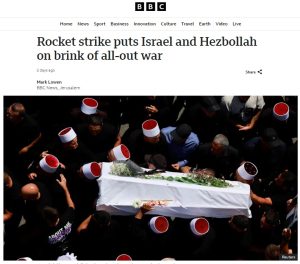
“Cross-border fire between Israel and Lebanon has grown steadily since 8 October, when Hezbollah fired rockets and shells at Israeli sites in solidarity with the Hamas attack on Israel a day earlier. Both groups call for the destruction of the Israeli state.”
Additional BBC News website reporting on the story will be discussed in part two of this post.
Related Articles:
A THIRD FEATURE PROMOTES THE BBC’S CHOSEN SIX DAY WAR NARRATIVE
GOLAN HEIGHTS RESIDENTS BUST THE BBC (AND UN) OBSOLETE NARRATIVE

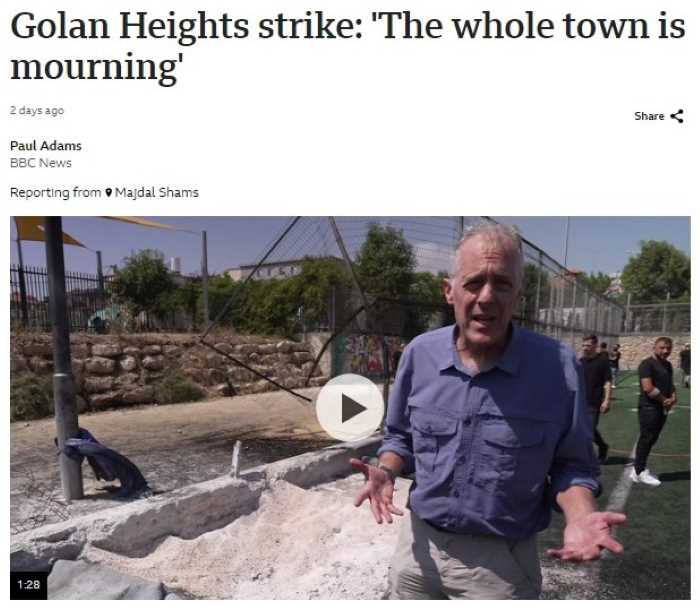

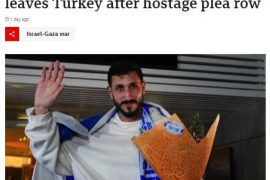
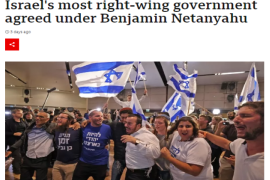

Yes that is what you get if you take in your employ Palestinian journalists and worse.
But I am so terribly sorry for what happened to these 12 Druzen boys.
There’s the term ‘dictator capture’. It started in the 2nd Gulf War when western journalists colluded with the Saddam regime in return to access to footage and interviews. They meekly went wherever their ‘minders’ took them and repeated what their minders told them. But we’ve never witnessed media capture on the scale regarding Israel’s struggle against the Mafia-terrorist regimes of Hamas and Iran’s other proxies. Journalists in comfortable hotels in Jerusalem spew forth daily anti-Israel propaganda directly from their sources inside Hamas, Hezbollah, IJ, including of course UNRWA employees and ‘aid workers’, vetted by Hamas. Their sources are too precious an asset to alienate by questioning their disinformation.